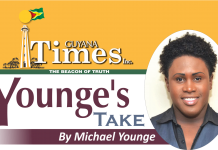Guyanese have, for decades, been locked in a heated debate about what form or type of government can deliver the populace from its shackles of poverty and inequity, while setting the institutional and infrastructural framework for the country’s overall development through a mixture of modern constitutional reforms and futuristic ideologies.
Since the pre-Independence era, some Guyanese scholars have believed that a national unity government, comprising of a number of erudite and principled political parties and actors under one umbrella, was the answer to the country’s political woes. They felt strongly that the national unity government should be patriotic in nature, and must have the political acumen to address race and ethnicity in order to build a more equal and unified Guyana, where every citizen could thrive personally, religiously and economically.
Others believed that shared governance amongst the various ethnic groups that occupied Guyana could result in a better situation politically, given the decades-long political and power conflicts which has retarded the country’s development and growth. They hold the view that there is massive distrust amongst the Indo- and Afro-Guyanese populace, given their colonial and post-Independence experiences.
Therefore, if a formula were worked out that saw them governing together side-by-side and in the interest of each other, the levels of distrust would eventually decline; growth in various constituencies would be almost equal, and the concept of racism would die a slow death.
But there is another set of intellectuals who have always believed that the two aforementioned forms of government would be disastrous for the country, because they would result in deeper divisions, racial inequality, discrimination amongst minorities, and a failed state. In fact, they believe that independent political figures, parties and groups should be allowed to compete against each other to form governments based on their own independent ideologies and economic beliefs — which would have to be approved by a voting public.
It didn’t matter what they looked like or how drastic their plans were, what was important was the intent of their plans and the integrity of their leaders, as well as who would ultimately benefit from their ambitious reforms.
The concept of forming coalitions therefore sprang from the first group, while the notion of power of the third party was birthed through the ideology of the last group. Over time, Guyana would have experimented with both, but the results were not positive, and little political or socio-economic benefits were derived. It is true, however, that the independent parties have, over the past 50 years, achieved more in office than the coalitions of the United Force and PNC or the AFC and PNC put together.
In fact, more tangible development was derived under the tenure of the PPP, which had set up an informal civic non-political component, when compared to other governments, both colonial and independent. This may have been because the party, which is still predominantly Marxist in its political and economic thrust, infused characteristics from all three of the schools of thought put forward above.
The PPP also believed in national unity, as exemplified in its posture under Cheddi Jagan, who appeared to have always looked past the interests of his Indo-constituents in order to put country first, and who treated the welfare of all Guyanese as paramount. This was very evident as he rallied against rigged elections and after rigged election which kept Forbes Burnham and the PNC at the helm of the State.
Also, following Jagan’s death, Bharrat Jagdeo should be credited for the work he did in addressing the lack of trust among competing political parties and ethnic groups during his tenure. He engineered meaningful constitutional reforms and various white papers on the way forward for Guyana’s development. Jagdeo even proposed terms and conditions for the PNC and PPP as well as other parties to consider if trust was to be rebuilt and national healing and reconciliation realized amongst those affected by the acts of his party and other PNC governments.
Robert Corbin and Desmond Hoyte, who were opposition leaders during the rulership of the PPP, appeared to understand the need to tread carefully and to put their presidential ambitions aside so that Guyana could remain first.
Unfortunately, the PPP’s overall success in advancing the right form and mixture of ideologies whilst in Government for 23 years has been undermined by accusations of corruption and discrimination against Afro-Guyanese. Equally, while some had hoped that David Granger and the AFC had the right formula, events that have unfolded over the past two and a half years are challenging the bedrock of their beliefs. It appears that the new coalition, premised on the first school of thought, is doing more harm than any of the other ideologies, because growth has slowed, corruption is up, ethnic tension is high, and policy confusion as well as double-standards abound at the highest levels of the Government and State. Guyana is in regression and on a steady path of decline.










